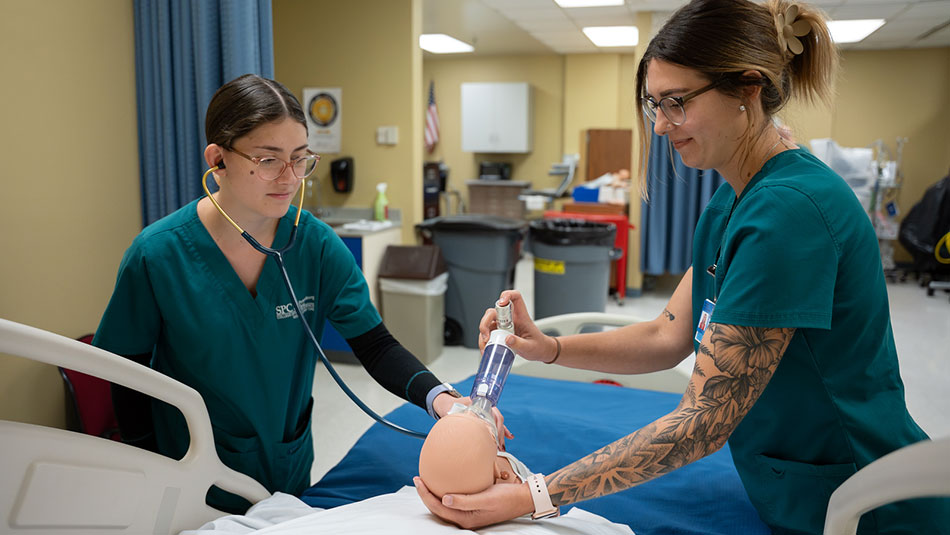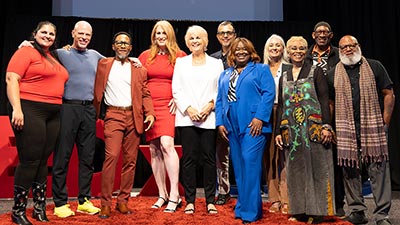SPC Launches Three New Bachelor's Degrees
Cathi Carr | 10/1/2024

With the launch of three new bachelor’s degrees, St. Petersburg College continues to invest in programs that meet growing workforce demands and deliver excellence in learning. The new bachelor’s degrees include Cardiopulmonary Science, Digital Media and Secondary English Education.
SPC is well known for its ability to pivot and offer degrees and training that are relevant and timely. When the State Board of Education unanimously approved the new bachelor’s degrees at its April meeting, members praised the College for being at the forefront of identifying high-demand, high-wage job opportunities in the community and partnering with the private sector.
“SPC President Tonjua Williams has been the tip of the spear, and you all have been really aggressive about this, and I think set a great example of what all our colleges should be doing,” said Board Member Monesia Brown.
Cardiopulmonary Science Bachelor of Science Degree
Bachelor’s degrees are often the preferred degree to enter certain health fields and for advancement in others.
SPC’s new Cardiopulmonary Science Bachelor of Science Degree is a good example of how requirements evolve. The degree is an extension of SPC’s Associate in Science degree in Respiratory Care that has placed all its graduates into careers or continuing education since 2015. Increasingly, hospitals prefer to hire practitioners with baccalaureate degrees for bedside clinical positions.
“The profession of respiratory care has been moving to the bachelor’s degree for some time now,” said Program Director Steven Hardt. “As the profession is becoming more complex, the higher degree is necessary.”
Specifically designed for practicing registered respiratory therapists, the program’s curriculum leads to advanced credentials in neonatal and pediatric and adult critical respiratory care and focuses on leadership, management, education and research. Courses include patient education and advanced capstone experiences tailored to practicing registered respiratory therapists’ needs and require no clinical or campus time. The capstone experience can be completed locally wherever students reside.
“I eagerly anticipate this bachelor’s degree will provide more opportunities for our respiratory therapists to better serve our community,” said Scott Pino, former Respiratory Manager at BayCare Health System.
Secondary English Education Bachelor of Science
The new Bachelor of Science in Secondary English Education includes endorsements in Reading and English for Speakers of Other Languages (ESOL) and will help fill the need for teachers in one of the most critical shortage areas in Florida, said Heather Duncan, Dean of SPC’s College of Education.
 Critical teacher shortage areas are those certification areas where substantial numbers of teachers who are not certified in the appropriate field are being hired to teach such courses, where significant vacancies exist and where postsecondary institutions do not produce enough graduates to meet the needs of Florida’s K-12 student population.
Critical teacher shortage areas are those certification areas where substantial numbers of teachers who are not certified in the appropriate field are being hired to teach such courses, where significant vacancies exist and where postsecondary institutions do not produce enough graduates to meet the needs of Florida’s K-12 student population.
“Currently in Pinellas County, there is a demand for over 118 employees in this field every year,” said Dr. Matthew Liao-Troth, Vice President for Academic Affairs at SPC. “It is a constant challenge for Pinellas County schools to find these qualified individuals."
The Reading and ESOL (English for Speakers of Other Languages) endorsements will make graduates more marketable and well-prepared for their careers as middle or high school teachers, Duncan added.
This program joins two others that were created in spring 2024 to meet growing workforce demand: the Prekindergarten/Primary Education (age 3 through Grade 3) Bachelor of Science degree and the Training and Development Advanced Technical Certificate. The credentials help meet workforce demand for preschool teachers and training and development specialists, respectively.
Digital Media Bachelor of Applied Science
 This bachelor’s degree in digital media builds on SPC’s certificate and associate degree that prepare graduates to work as graphic designers, digital videographers, animators, and content, instructional and game designers. The four-year degree is focused on employability and can help graduates achieve a level of career stability that freelance work cannot.
This bachelor’s degree in digital media builds on SPC’s certificate and associate degree that prepare graduates to work as graphic designers, digital videographers, animators, and content, instructional and game designers. The four-year degree is focused on employability and can help graduates achieve a level of career stability that freelance work cannot.
“As creatives, we all work in the gig economy at some point,” said Barbara Hubbard, SPC’s Dean of Arts, Humanities, and Design. “This degree can open whole new avenues for our graduates, so they are ready to become art or marketing directors who manage the artists and their work, which is what
businesses are looking for.”
For SPC student Dar Green, that chance to stay close to home and study digital media was particularly appealing. He has completed half of his Associate in Arts degree and is excited to embark on the bachelor’s degree next fall.
“I love that SPC teaches different aspects of digital media, and not just animation, which is what I’ve loved since I was 15,” said Green, 19. “It gives me a much broader experience.”



